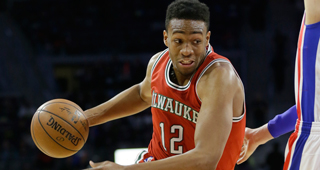It’s been a weird few years for the Chicago Bulls. After an unromantic end to the gritty and beloved Tom Thibodeau phase of the franchise (now re-enacting itself in unsettlingly vestigial fashion for the Minnesota Timberwolves), new coach Fred Hoiberg was given a series of grab bag rosters. The former NBA reserve shooting guard was strapped with two differently mismatched veteran rosters to kick off his pro coaching career, but the Bulls’ front office has now fully leaned into a youth-first program that will test Hoiberg’s ability to shape raw material into something that moves with identity and purpose.
Gone are the impossible psychological riddles presented by a locker room dominated by a trio of men self-titled “three alphas,” but which included one player in his superstar prime and two whose best battles were fought in a league that wasn’t sure if Steph Curry belonged in it. Here now, in Chicago, is a voyage with five men; one is not old enough to legally drink, and another has recently earned that privilege. None are sanctioned to rent a car. All of them are, the organization is betting, living the beginnings of stories with much left to tell.
As a resident of the city they play in and a fan of the team much too psychologically hapless (read: brave) to resist the lure of optimism, this excites me. While even the post-human quant crowd of contemporary NBA analysis—a cult of late capitalism with disturbingly little self-awareness, determined to pre-define men in their early twenties—is enthusiastic about the prospects of Lauri Markkanen and Wendell Carter, Jr., I find Kris Dunn, Jabari Parker, and even Zach LaVine to be worthy members of a new movement of Chicago basketball. They all do fun things on a basketball court, things I like to look at, and my mind runs to quite colorful places when I consider what sort of synergy they might all have together through a full season of liberation; Hoiberg is notoriously non-authoritarian, and the only notable veteran on the team is the eminently wise and supportive Robin Lopez.
Parker and LaVine, in particular, have stemmed the excitement of many highly invested followers. Through a few seasons, both have been porous defenders and somewhat individualistic in their offensive production. Both have also torn ACLs—two, in Parker’s case. It is easy to see the recruitment of both men as signings made not for the best “basketball reasons” (a phrase which suggests that a game could ever truly exist in a vacuum), particularly at their considerable price tags. They are recognizable faces. Parker for his hometown roots; LaVine for his memorable performances as a two-time Slam Dunk Contest champion. One might conclude that bringing both players to the team was more about optics and ticket sales than strategic mastery.
There is a counterpoint to this sort of thinking, and that counterpoint is: shut up, who cares, basketball is cool, they’re young, let’s wait and see what happens. I couldn’t care less about what some rococo nascent metrics about what shooting a basketball really means are supposed to be telling me. Congratulations, dudes, on inventing numbers that ruin a party before it starts. While Milton Friedman is certainly dabbing in his grave, I personally follow sports because they are played by humans; the game is not a game but a vehicle to the fascinating struggles toward achievement and collaboration it presents, and all the levity, enmity, and absurdity it presents to us along the way. Intensely following basketball is yet another way to love, and my bespoke version of love has no correlation with Win Shares.
The factionalism among Bulls fans, as they part into camps curious or excited about this squad and those enraged by its inefficient composition, happens—as all things in this NBA decade do—within the giant narrative shadow that LeBron James still casts over everything else. James’ signing with the Los Angeles Lakers and their subsequent acquisitions of Lance Stephenson, Rajon Rondo, and JaVale McGee suggest he, too, is moving forward with greater cue from his heart and ineffable vision than his graphing calculator. The Lakers are unlikely to challenge the defending champion Golden State Warriors, but again the question presents itself: who cares? The Lakers promise to be a singular spectacle, a cultural happening that will spawn a million bizarre details and life-giving intrigue.
Obsession with a bottom line that is uniformly bent on championships has real emotional damage. It leads to a perspective that can’t help but view players as disposable, interchangeable cogs in an enterprise more about a fragile pride in The Region—or, even worse, The Company—than it is about luxuriating in a time and place together, happy for the company regardless of what levels of glory one might attain. Maybe there will be an uptick in victory, year to year, and certainly that would feel good. But there is a whole range of experience that’s pretty detached from the win-loss binary, a range that’s instantaneously glazed over in the paid-for appraisal of most player movement. Why is that we have created an intellectual environment that evaluates players in the way we’d want an Amazon review to evaluate a screwdriver? This is a failure of empathy and, perhaps even worse, a failure of imagination.



